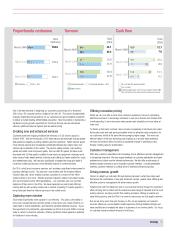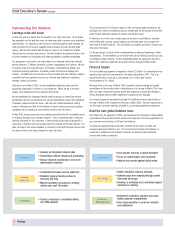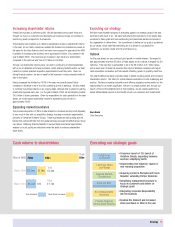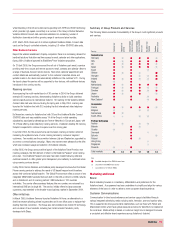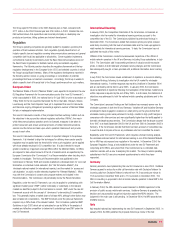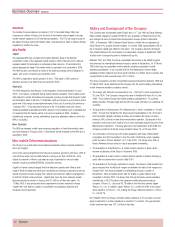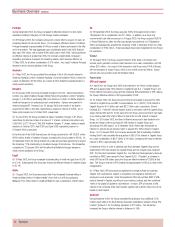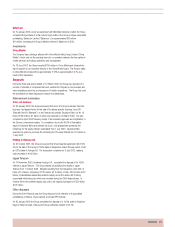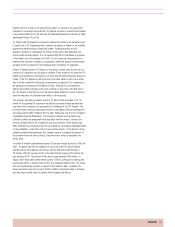Vodafone 2005 Annual Report Download - page 19
Download and view the complete annual report
Please find page 19 of the 2005 Vodafone annual report below. You can navigate through the pages in the report by either clicking on the pages listed below, or by using the keyword search tool below to find specific information within the annual report.
Business |17
The Group spent £219 million in the 2005 financial year on R&D, compared with
£171 million in the 2004 financial year and £164 million in 2003. Besides the core
R&D outlined above, this expenditure was incurred principally on developing new
products and services, billing systems and network development.
Regulation
The Group’s operating companies are generally subject to regulation governing the
operation of their business activities. Such regulation typically takes the form of
industry-specific law and regulation covering telecommunications services and general
competition (anti-trust) law applicable to all activities. Some regulation implements
commitments made by Governments under the Basic Telecommunications Accord of
the World Trade Organisation to facilitate market entry and establish regulatory
frameworks. The following section describes the regulatory framework and the key
regulatory developments in the European Union (“EU”) and selected countries in which
the Group has significant interests. Many of the regulatory developments reported in
the following section involve on-going proceedings or consideration of potential
proceedings that have not reached a conclusion. Accordingly, the Group is unable to
attach a specific level of financial risk to the Group’s performance from such matters.
European Union
The Member States of the EU (“Member States”) were expected to implement the new
EU Regulatory Framework for the communications sector (the “new EU Framework”),
which was adopted in 2002, into national law by 24 July 2003 or prior to accession on
1 May 2004 for the ten countries that joined the EU on that date. Belgium, Greece,
Luxembourg and the Czech Republic have yet to implement the new EU Framework
and there are ongoing infringement proceedings against a number of Member States
for late or inadequate implementation.
The new EU Framework consists of four principal Directives outlining matters such as
the objectives to be pursued by national regulatory authorities (“NRAs”), the way in
which telecommunications operators are to be licensed, measures to be taken to
protect consumers and ensure universal provision of certain telecommunications
services and the terms and basis upon which operators interconnect and provide
access to each other.
The new EU Framework introduces a number of important changes to the previous
framework. It is intended to align the techniques for defining where sector specific
regulation may be applied and the threshold for when such regulation can be applied
with those already employed in EU competition law. It is also intended to ensure
greater consistency of approach amongst NRAs within the Member States. All NRAs
are required to take utmost account of the list of markets which are specified by the
European Commission (the “Commission”) in a Recommendation when deciding which
markets to investigate. The first such Recommendation was published by the
Commission in February 2003 and includes markets at a wholesale level, for ‘voice call
termination on individual mobile networks’ (the “Call Termination Market”), the
‘wholesale national market for international roaming’ and the market for ‘access and
call origination’ on public mobile networks (together the “Relevant Markets”). NRAs
may, with the Commission’s consent, also propose markets not included in the
Recommendation. The Commission will periodically review the Recommendation.
Regulation, under the new EU Framework, can only be applied to undertakings with
significant market power (“SMP”) (either individually or collectively) in the relevant
markets so identified, subject to the Commission’s consent. SMP under the new EU
Framework accords with the concept of “dominance”under existing EU competition
law. This generally implies a market share of at least 40%, although other factors may
also be taken into consideration. The SMP threshold under the previous framework
required only a 25% share of the relevant market. The Commission published SMP
Guidelines in July 2002 which set out principles for use by NRAs in the analysis of
markets and effective competition to determine if undertakings have SMP under the
new EU Framework.
International Roaming
In January 2000, the Competition Directorate of the Commission commenced an
investigation into the market for international roaming services pursuant to the
competition law of the EU. The Commission published its preliminary findings in
December 2000. The Commission stated that excessive pricing and price collusion
were likely concerning both the level of wholesale rates and the mark-ups applied in
retail markets for international roaming services. To date, the Commission has not
published the results of this review.
Officials of the Commission conducted unannounced inspections of the offices of
mobile network operators in the UK and Germany, including Group subsidiaries, in July
2001. The Commission said it was seeking evidence of collusion and/or excessive
prices, in relation to both retail and wholesale roaming charges, and the Commission
has subsequently sought, or been provided with, additional information about roaming
charges.
In July 2004, the Commission issued a statement of objections, a document detailing
its proposed findings, following its investigation into the UK market for wholesale
international roaming. A written response was made by Vodafone in December 2004
and an oral hearing will be held in June 2005. In January 2005, the Commission
issued a statement of objections following its investigation of the German market and a
written response is required by the end of May 2005. In both cases, the statement of
objections was addressed to both the national mobile operating subsidiaries and to the
Company.
The Commission’s proposed findings are that Vodafone has monopoly power over its
wholesale customers in both the UK and Germany. Vodafone UK and Vodafone Germany
are alleged to have engaged in excessive or unfair pricing on the grounds that their
wholesale roaming prices were perceived to be high, resulted in high profit margins in
comparison with other services and were significantly higher than the tariffs applied to
domestic wholesale access services. The Commission alleges that the abuse occurred
from 1997 to at least September 2003 in the UK and from 2000 to December 2003 in
Germany. If the Commission decides that there had been a breach of competition law,
it would be able to impose a fine on any addressee who had committed the breach.
Separately, under the new EU Framework, which requires a forward looking analysis,
the wholesale national market for international roaming is one of the Relevant Markets
but no NRA has yet proposed any regulation in this market. In December 2004, the
European Regulators Group, a body established under the new EU Framework and
comprising all EU NRA’s, announced that it had commenced a co-ordinated data
collection exercise with a view to analysing this market. The Group’s mobile operating
subsidiaries in the EU have since received questionnaires to which they have
responded.
Germany
Germany enacted a law implementing the new EU Framework in June 2004. Vodafone
Germany agreed to reduce its mobile call termination rate with Deutsche Telekom for
incoming calls from Deutsche Telekom’s network from 14.3 eurocents per minute to
13.2 eurocents in December 2004 and to 11.0 eurocents in December 2005. The
NRA is consulting on proposals to find all mobile network operators to have SMP in the
Call Termination Market.
In February 2004, the NRA decided to award licences for 450MHz spectrum for the
provision of public access mobile radio services. Vodafone Germany is appealing this
decision and unsuccessfully sought an injunction against the NRA’s decision. The
judgment in the main case is still pending. In December 2004, the NRA awarded two
450MHz licences.
Italy
Italy enacted national law implementing the new EU Framework in September 2003. In
January 2005, the NRA published its proposals following a review of the Call


